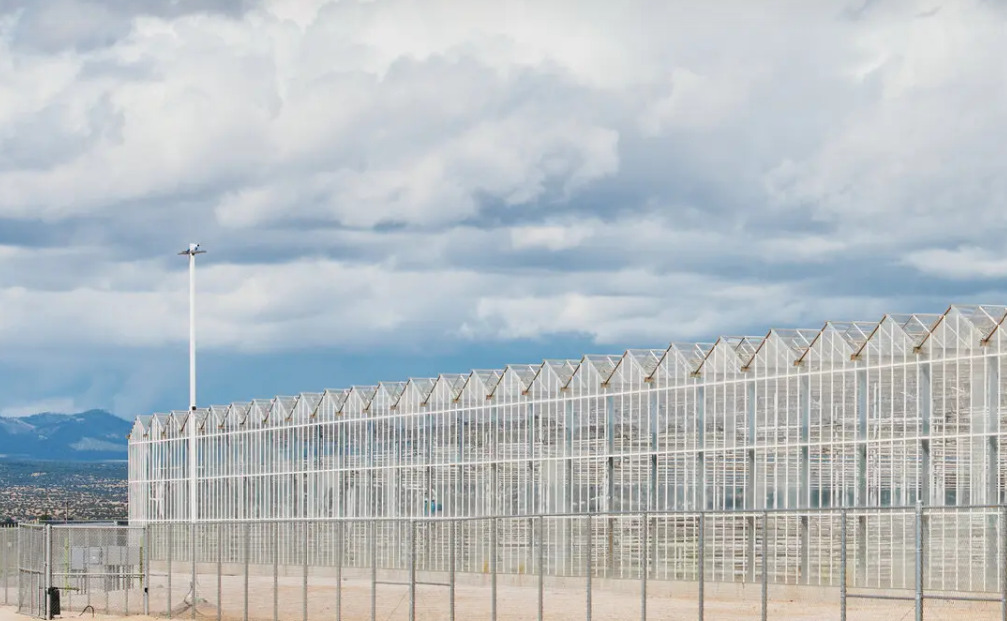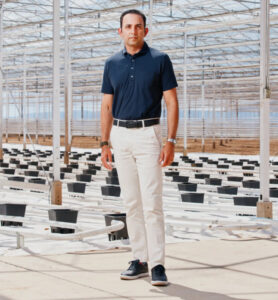
Time to end secret data laboratories—starting with the CDC
The American people are waking up to the fact that too many public health leaders have not always been straight with them. Despite housing treasure…
Thought Leader: Marty Makary

This piece is by WWSG exclusive thought leader, Peter Goodman.
Never mind that everyone calls him Groovy, or that the company he oversees — Bright Green — is preparing to grow cannabis and opium poppies inside greenhouses on the high desert of New Mexico. Gurvinder Singh would like it known that his business is a rigorous scientific enterprise.
Mr. Singh spends much of his time straining to dislodge the assumption that his company is part of the wave of retail marijuana shops popping up in many communities in the wake of legalization in many states. His 70-acre farm will be centered on producing raw materials for pharmaceuticals that use cannabis, opioids and additional medicinal plants to treat pain, depression and anxiety.
Bright Green has secured a rare license from the Drug Enforcement Administration to grow otherwise-illegal crops for use in research and the manufacture of federally approved medicines. The company, which hopes to start operating by early next year, has positioned itself to bolster American self-sufficiency in an age of growing concern over the vulnerability of critical supply chains.
Just as the Biden administration has subsidized the construction of computer chip and electric vehicle factories to limit dependence on foreign suppliers, it has focused on increasing domestic production of the ingredients needed to make pharmaceuticals. President Biden included that objective as a matter of national security in a 2021 executive order aimed at protecting Americans from shortages of crucial products.

“It’s kind of scary to think that all your medicines, the active ingredients come from so many different countries,” Mr. Singh, 47, said. “We want to be able to bring the supply chain back to the United States.”
For now, Mr. Singh, who joined the company as chief executive last year, is mostly focused on wooing investors to make his company operational. With no revenue, Bright Green’s stock has been trading below 30 cents a share this year — a drop of more than 95 percent since its initial public offering in 2022. It was recently taken off the Nasdaq exchange.
Mr. Singh expects to secure $15 million, a sum that would allow Bright Green to plant its first crop of cannabis and poppies inside the green houses constructed at what was previously a tomato farm in the small town of Grants, about 80 miles west of Albuquerque.
The company has announced an agreement to supply marijuana extracts and other plant-based elements to Benuvia Operations, a Texas company that makes tinctures used by cancer patients to alleviate the nausea associated with chemotherapy.
“This allows us to have a stable domestic supply,” said Benuvia’s chief executive, Terry Novak.
Assuming Mr. Singh can secure financing, his company could start bringing in $1 million to $2 million a month by next summer, he said, and as much as $5 million a month by the end of 2025.

Longer term, Bright Green has designs on genetically engineering more effective strains of cannabis, opioids and the other crops it can legally grow such as peyote and psilocybin mushrooms.
Mr. Singh seems an unlikely figure for the realm of psychedelics and hallucinogens. He was born and raised in Malaysia, which has long displayed extreme intolerance for drugs, executing traffickers. His father was a military general. Mr. Singh had never tried marijuana until he consumed an edible after moving to California as an adult.
“Not my cup of tea,” he said.
His grandfather was a trader who tapped suppliers in Iran and Turkey for Islamic prayer rugs he sold in Malaysia. He schooled his grandson in international business, taking him on his travels.
Mr. Singh started his own career in the fashion industry, connecting American surf wear brands like Billabong with fabric and garment factories in Asia.
Later, he moved to the United States and branched into real estate. That led him to take a stake in a farm near Santa Barbara, Calif., that was being developed to grow marijuana in anticipation of the state’s legalization in 2018. That experience gave him the knowledge of production that prompted Bright Green to hire him.
The biggest impediment to the company’s aspirations has been difficulty in raising money. Banks have balked at lending to Bright Green, cognizant that cannabis is still illegal under federal law.

His primary pitch to investors centers on the need to safeguard domestic supplies of vital ingredients for pharmaceuticals in a time of geopolitical and environmental upheaval.
American manufacturers now purchase opium poppies from the Australian island of Tasmania, where severe droughts have damaged harvests. They also secure stocks grown in Afghanistan — technically illegal under U.S. law, but permissible by purchasing from traders in Turkey.
Despite increasing volumes of recreational marijuana grown in the United States for sale in states that have legalized it, those products fall short of the rigorous standards of purity demanded by the Food and Drug Administration for use in pharmaceuticals.
Before the emergence of Covid-19, only 28 percent of the factories making key ingredients for pharmaceuticals were in the United States, and 13 percent were in China, according to Congressional testimony from F.D.A. officials. This was the backdrop to the stark shortages of medicines and other critical goods that played out during the pandemic.
The trade war between the United States and China has prompted Western companies to explore alternatives to relying on Chinese factories. Disruptions to the global shipping industry have led major brands to shift their manufacturing closer to major markets. Russia’s war on Ukraine has enhanced the sense that the world is dividing into rival camps, increasing the value of national production.
Crises on multiple shores have revealed how shortages of any single ingredient — for medicines, industrial chemicals and computer chips — can stymie production at factories across oceans.
“There is a realization that we have very poor visibility into upstream supply,” said Marta Wosińska, a senior fellow at the Center on Health Policy at the Brookings Institution in Washington. “People are starting to think more about these kinds of risks.”
In recent months, Mr. Singh has been courting financial backers in Singapore through a federal program that delivers American visas with a pathway toward legal resident status for those who invest at least $800,000.
He brings them to Grants, a town of roughly 10,000 people, where prefabricated homes are laid out on a grid framed by jagged mountains. The surrounding desert is dotted by Indian casinos, R.V. parks and solar farms.
From a distance, the greenhouses shimmer like an oasis. Up close, they feel like a remote prison complex. The dusty expanse is ringed by a high security fence and monitored by security cameras. Once the plants are installed, the grounds will be patrolled by a round-the-clock security force.
All of these are conditions of the company’s D.E.A. license, the means of preventing thieves from penetrating the farm and stealing the crop.
The federal department vets and approve all hires at the site. Inside storage sites are constructed like bank vaults and armed with vibration sensors.
“This needs to be like Fort Knox,” Mr. Singh said.
His plant’s manager, Fred Davis, 44, is a member of the local Acoma Pueblo Native American tribe. The community suffers chronically high rates of unemployment and has been largely dependent on a trio of nearby prisons for jobs. Mr. Davis is looking forward to hiring as many as 20 local people.
Mr. Davis used to work at the tomato farm. At Bright Green, he is mastering security systems, construction and the minutiae of watering.
“It’s a whole bigger game to me,” he said. “It’s a whole different learning curve.”
On a recent morning, the storage and processing areas were empty. A freshly renovated office wing sat eerily silent.
The sun filtered through the glass panes of the A-frame greenhouses, down to empty concrete pots awaiting plants.
But as Mr. Singh surveyed the works, he envisioned a harvest that could be only four months away.
“We can make this happen,” he said.
Time to end secret data laboratories—starting with the CDC
The American people are waking up to the fact that too many public health leaders have not always been straight with them. Despite housing treasure…
Thought Leader: Marty Makary
David Frum: How Harris Roped a Dope
This piece is by WWSG exclusive thought leader, David Frum. Vice President Kamala Harris walked onto the ABC News debate stage with a mission: trigger…
Thought Leader: David Frum
Michael Baker: Ukraine’s Faltering Front, Polish Sabotage Foiled, & Trump vs. Kamala
In this episode of The President’s Daily Brief with Mike Baker: We examine Russia’s ongoing push in eastern Ukraine. While Ukrainian forces continue their offensive…
Thought Leader: Mike Baker

